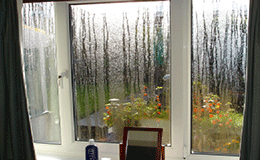How to stop condensation on windows
| Tweet |
Last updated: 26/06/2015.
Is ventilation the key?
Condensation is arguably the most common type of dampness, which can appear at your home. This condensation comes with some not so good effects such as the peeling of the wall paper, appearance of damp patches on the walls and moisture buildup on the windows. When condensation is left untreated, it can lead to the creation of mould growth and this can be very harmful and may result in some breathing difficulties and other health complications. To avoid all these problems, it is essential that you follow these recommendations to avoid condensation at your place.
- Open windows everyday to ensure your home is properly ventilated at all times.
 Furthermore, ensure that drip vents on your windows stay open in order to allow extra air to flow in your home and combat condensation.
Furthermore, ensure that drip vents on your windows stay open in order to allow extra air to flow in your home and combat condensation. - In case you own a tumble dryer or a washing machine at your home, it is essential you ensure it is properly ventilated. According to experts, a single washing load leave between two and three liters of air emitted in the air and this can be a recipe for real disaster.
- After taking a shower or a bath, the air will be having excess moisture. You can avoid the formation of condensation by ensuring that the windows of your bathroom stay open and by turning on the extractor fans. In addition, ensure that the bathroom door remains shut to avoid moisture escaping to other parts of the house.
- The kitchen is among the main sources of condensation in homes. When cooking, it is important that you have the pans covered with a lid in order to minimize moisture. In addition, you should keep the window open and once you are done cooking, leave them open for about half an hour so that the air can get cleared.
- When it comes to drying clothes, it is very important that they are dried outside at all times. In case this is not possible, dry them in a room that is enclosed and ensure that the window stays open. In case you are drying the clothes using a tumble dryer, ensure that you have a ventilation pipe that runs outside the property so that the damp air can be ferried outside your home.
- Portable paraffin heaters and gas bottles also tend to produce moisture in high amounts not to mention the toxic fumes they produce as well. This kind of heat doesn’t just cause excessive condensation at your home but can also be a serious safety and health hazard that can lead to serious health problems if you are not careful.
- Most households usually have in- house plants and pets that produce a lot of moisture. Fish tanks should be covered and moving the plants outdoors could help prevent excessive condensation.
Other things you can do to improve ventilation and avoid condensation is ensuring water is not leaking in through the roof and that the down pipes and guttering as well as your air conditioning system are all in a perfect condition.
